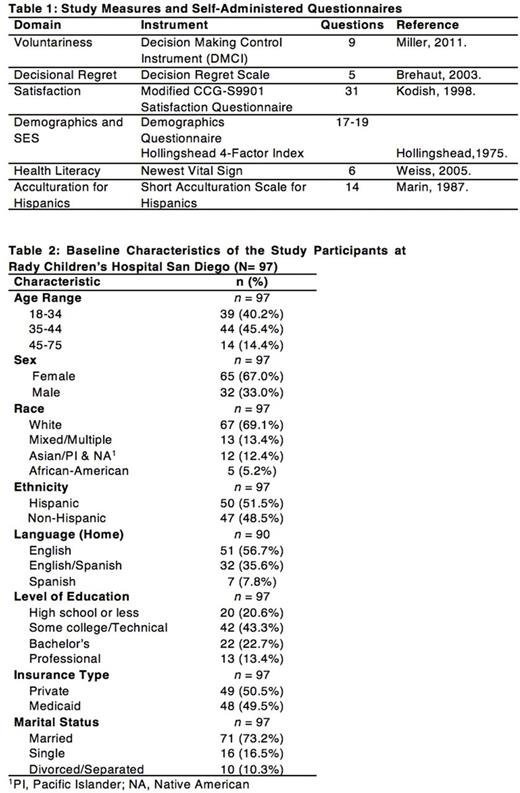Abstract
Introduction :
Valid consent for research requires that the decision be both informed and voluntary. For parents and legal guardians, it is essential that they fully understand their role when giving consent to participation of their child in research. Previous studies on parental informed consent in pediatric settings have focused largely on disclosure and understanding (Kodish, JAMA, 2004; Chappuy, Arch Dis Child, 2010) and motivations for agreeing to or declining research participation (Petersen, Pediatr Blood Cancer, 2013). When presented with a cancer clinical trial for their child, parents often do not understand the many components of informed consent, including voluntariness of participation (De Vries, BMC Med Ethics, 2011). In addition, individuals with limited English proficiency have reported lower understanding and satisfaction during informed consent (Breese, J Empir Res Hum Res Ethics, 2007). There is limited research on perception of voluntariness of participation in pediatric leukemia clinical trials. The aim of this study was to examine socio-demographic and contextual correlates of perception of voluntariness, decisional regret, and satisfaction in parents who had consented to participation of their child in a clinical trial for leukemia treatment. We focused on characterizing differences between non-Hispanics and Hispanics, as the latter is the fastest growing ethnic group in the U.S.
Methods :
Parents/guardians (n=97) of children aged 0-17 years with newly diagnosed leukemia, who had consented to participation of their child in a clinical trial for leukemia treatment at Rady Children's Hospital San Diego were prospectively recruited. Of the 135 parents approached to participate in our study, 26 (19.3%) declined and 12 (11.0%) withdrew after enrollment. Reasons for declining or withdrawing included feeling overwhelmed, having no time, or having no interest in the study. Participants completed questionnaires assessing perception of voluntariness, decisional regret, satisfaction, health literacy, socio-demographics, and acculturation level, if Hispanic (Table 1). Perception of voluntariness, decisional regret, and satisfaction outcomes were analyzed by socio-demographics, health literacy, and acculturation levels using logistic regression.
Results :
Ninety-seven participants were surveyed, including 50 (51.5%) Hispanic and 47 (48.5%) non-Hispanic. Demographic characteristics of the participants are shown in Table 2. We found that higher health literacy was associated with higher perception of voluntariness (p<0.001), socioeconomic status (SES) (p<0.001), and acculturation (p<0.001). Hispanic participants reported lower health literacy (p<0.001) compared to non-Hispanic participants. Spanish-speaking participants reported lower health literacy (p<0.001), lower perception of voluntariness (p=0.048), and lower acculturation (p<0.001) compared to English-speaking participants. In addition, participants with Medicaid reported lower health literacy (p<0.001) and lower SES (p<0.001) compared to participants with private insurance. Finally, participants with lower education levels reported lower health literacy (p<0.001). Decisional regret was overall low and satisfaction was overall moderately high across all subgroups and neither was significantly impacted by socio-demographics, health literacy, or acculturation.
Conclusions :
In this study, with equivalent numbers of Hispanic and Non-Hispanic participants, we found that Hispanic parents of children with newly diagnosed leukemia, and particularly Spanish-speakers, had inadequate health literacy and perception of voluntariness, despite overall high rates of satisfaction with the informed consent process for clinical trials. To our knowledge, this is the first study to associate lower health literacy with lower perception of voluntariness in parents of children with newly diagnosed leukemia. True voluntariness in participation is essential to the ethical practice of informed consent, and our study suggests that many Hispanics parents and those with limited English proficiency are not making truly informed decisions for their child with cancer. It is imperative to improve the informed consent process and facilitate informed decision making with culturally and linguistically appropriate interventions tailored to this vulnerable population.
Aristizabal: American Society of Hematology Scholar Award: Other: ASH Scholar Award for the submitted abstract, Research Funding; American Society of Pediatric Hematology/Oncology Clinician-Educator Award: Research Funding; Alex Lemonade Stand Foundation Psychosocial Grant: Research Funding; NIH/CTSA: Other: Pilot Grant, Research Funding. M: University of California San Diego School of Medicine Research Fellowship: Research Funding.
Author notes
Asterisk with author names denotes non-ASH members.


This feature is available to Subscribers Only
Sign In or Create an Account Close Modal